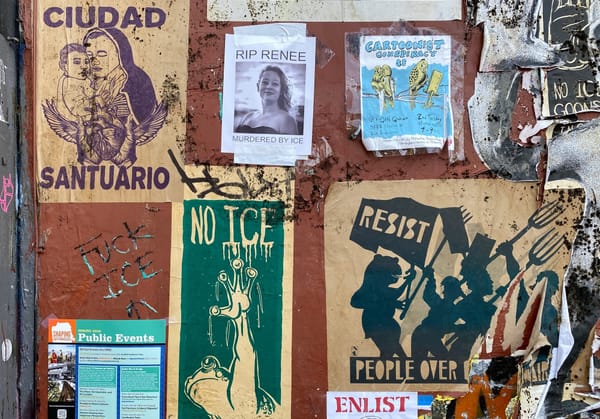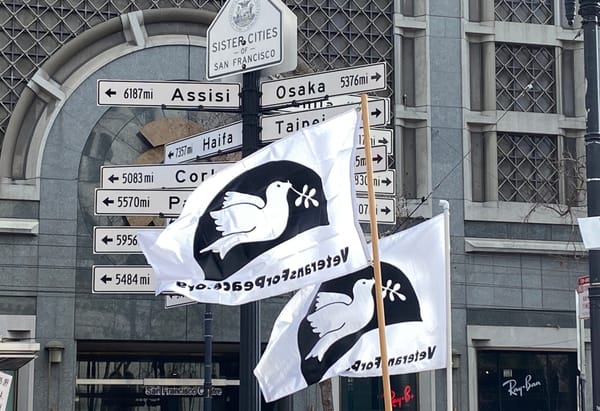In Honor of Joanna Macy, 1929-2025
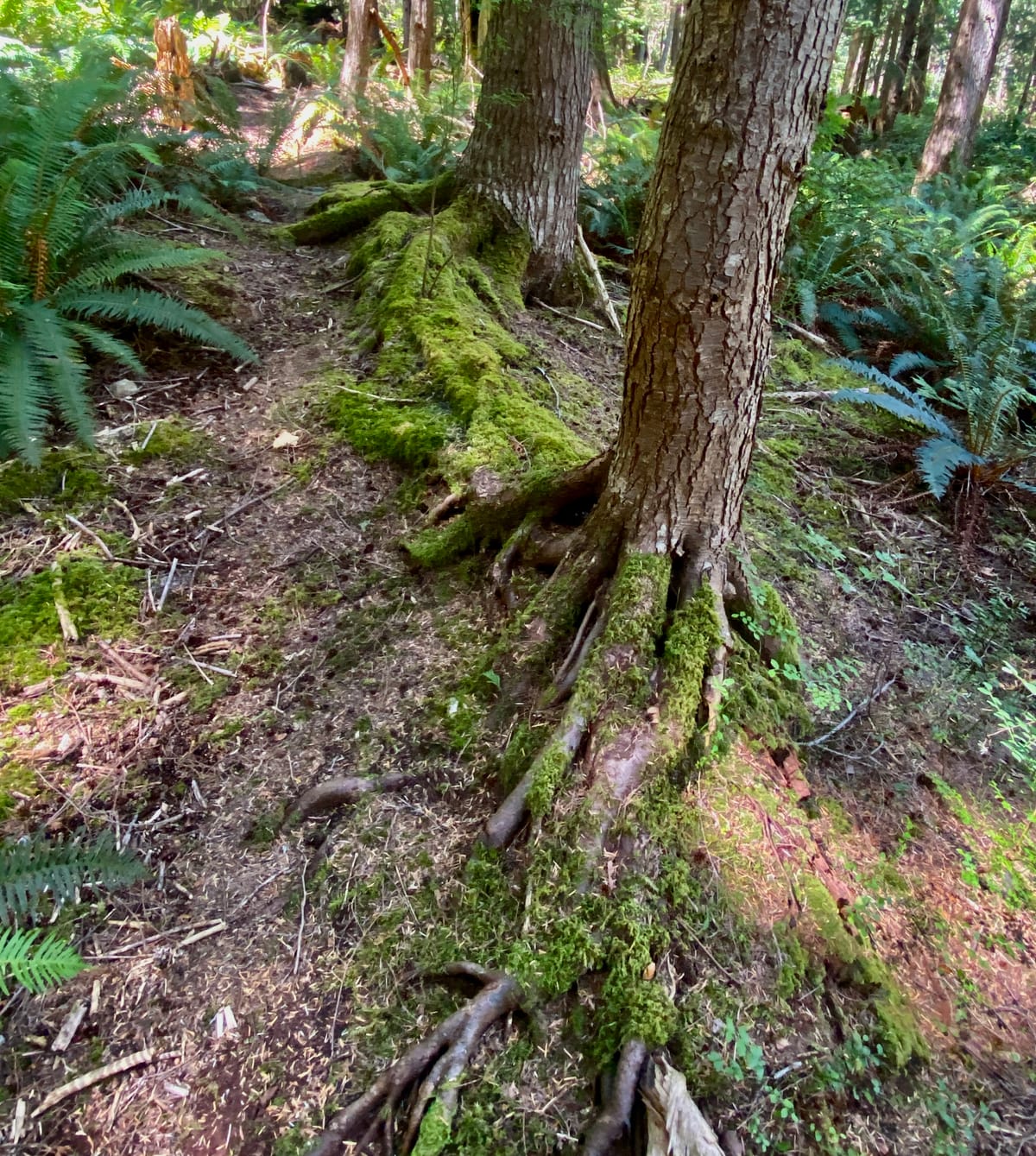
I write while staying in one of the great forests of British Columbia, a forest in which the inextricability of life from death is gorgeously evident. Several kinds of fern spring from this soil, some taller than me, birds move among the branches, many kinds of berries abound. It is lavish, almost hectic with life, and with the inextricability of life and death. Magnificent fallen trees turn back into soil as younger trees reach downward to twine around their ancestors' trunks and upward toward the sky. The roots growing around and gripping these decaying logs look like veins and tentacles and fingers clutching and reaching toward an anchor in the soil. Some of the mature cedars and conifers stand on mounds that must be fully decayed trees or rather once were trees and are further along in the process of becoming soil. Often a great tree that's fallen over still has at its base a tall shield that is its roots still clinging to rounded stones and soil, and from this the trunk stretches across the earth. These trees from which trees grow are known as nurse logs.
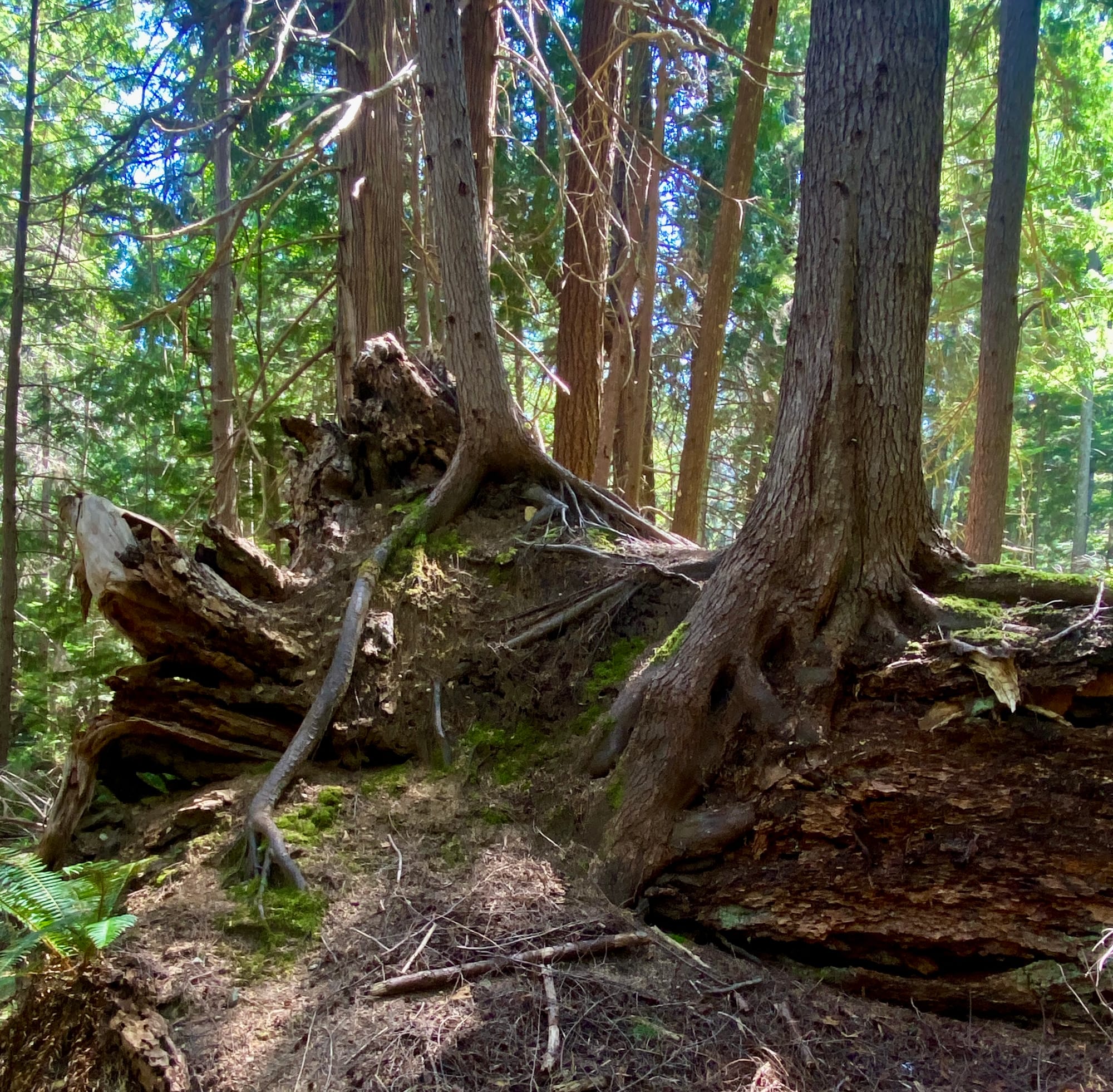
It was a good place to be when I heard of the death of Joanna Macy on July 19 at the age of 96. I had met her only a few times, but I knew her work, knew she was beloved by many I know, and important for many tens or hundreds of thousands more. Because 96 is a long life for a member of our species, if not for a tree, because I know she had a rich and full life, I am sad for all those who are grieving and will miss her, sad because every death is a reminder of my own and everyone's mortality, sad that I didn't spend more time with her, but not sad as if her life was in some sense incomplete or cut short. She died, by all reports, surrounded by those who loved her best and was lovingly cared for, and she lived about as fully as anyone can.
Macy once wrote, "It is good to realize that falling apart is not such a bad thing. Indeed, it is as essential to transformation as the cracking of outgrown shells. Anxieties and doubts can be healthy and creative, not only for the person, but for the society, because they permit new and original approaches to reality." She was talking about falling apart emotionally, letting the grief and despair and fear come through, not in order to drown in them but to let them flow and keep moving and maybe to not let them paralyze and let you or me or us, not to prevent us from doing the work that addresses what those emotions respond to.
But in those lines, she could also have been talking about forests, in which things are forever falling apart and working together. I think of what a forest without death would be, imagine trees that grew endlessly and never died, never gave their nutrients back to the soil and the next generations so wholly, never fell to create openings in the canopy younger trees could reach toward. Macy also spoke of our civilization as falling apart, and in doing so making room for new versions of who and what we can and must be to cease destroying the planet: "But what's amazing now for us, why you can be glad, is that it is falling apart. It is encountering the limits itself, and some of them have to do with climate as well, of course." I was in British Columbia, on this forested island, for a women's climate retreat, and nothing could make me feel better about the future than meeting the brilliant young women from Mexico, Columbia, the Philippines, the US, and Canada committed to this work.
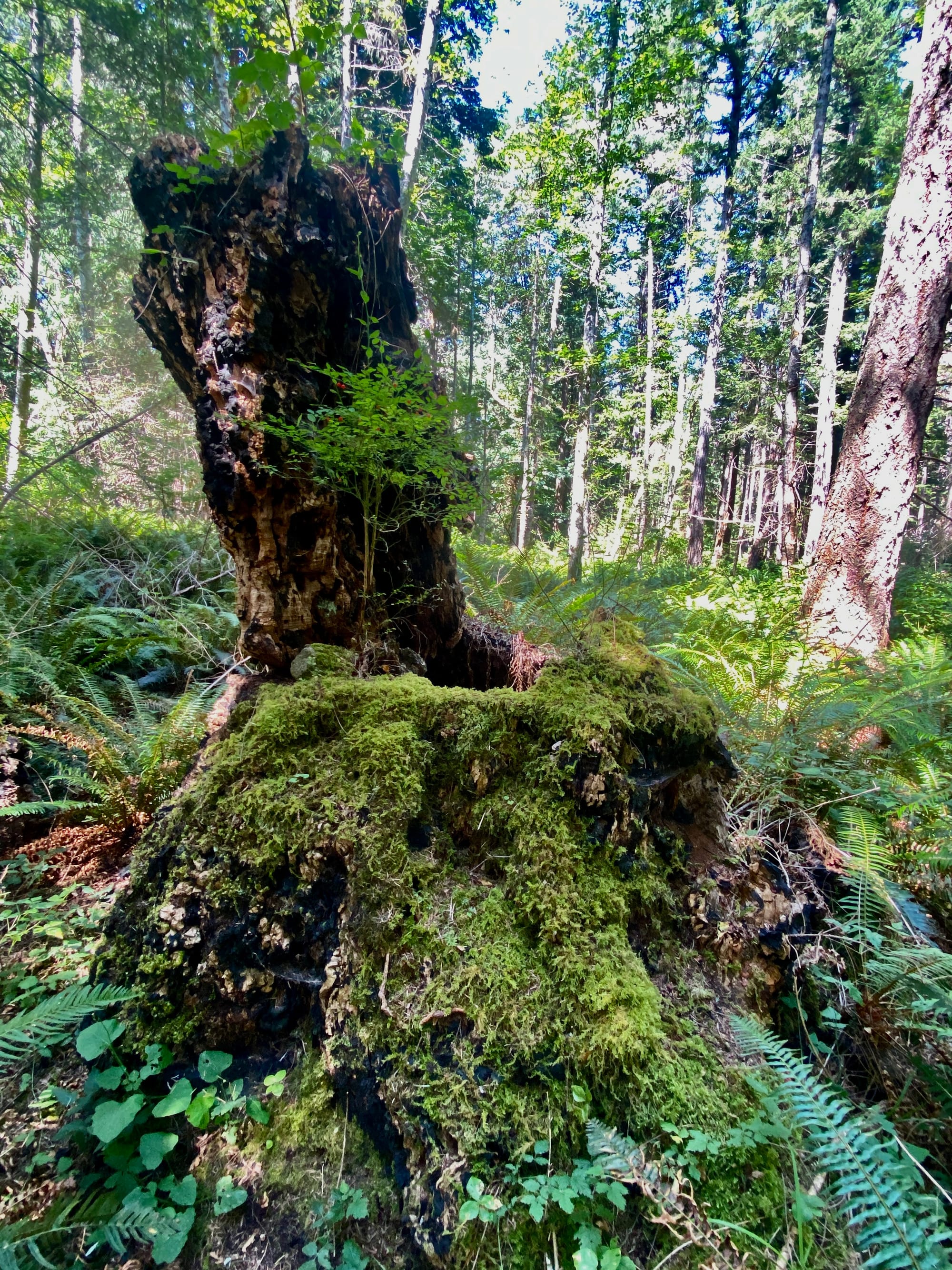
If you don't know Joanna Macy, she was many things: a translator of Rilke, a Buddhist and scholar of Buddhism whose dissertation was on alignments between Buddhist thought and systems theory, an antinuclear and an environmental activist, a teacher and trainer whose creative and deeply interactive workshops helped many people face grief and fear in the face of environmental and then climate catastrophe and keep going, the author of seventeen books, and the mother of three children. I visited her at her home late last year, and she was joyful, funny, brilliant, warm, living with a wall of scholarly books and a sunny deck looking over a shared garden.
When I was younger, I was taught what an artist or writer was supposed to aspire to was immortality, the kind that Dante and Li Po and Shakespeare have, so that in centuries to come memory of your name and attention to your creations continue. Later in life, I realized that there was an entirely different thing to aspire to, an entirely different kind of creative success: to be so much part of your own time, of the present that is making the future, that rather than remaining what people think about, you become in some way how people think, how they value, what they prioritize. You stop being what's in front of their eyes and become part of what is behind their eyes, how they see the world, how they live, act, what they aspire to, what they hold close, what they resist.
You you become a nurse log on which new life can grow as you compost into the soil we call culture. And maybe this is the mindset of moist places, of an ecology of vivid decay and regeneration rather than of the arid places, where death dessicates and the mummies, skeletons, ruins, Dead Sea Scrolls, last for centuries or millennia. Macy was raised as a Christian, had a loss of faith, and found another kind when she worked with Tibetan refugees in India in the 1960s. I believe she contributed hugely to the richness of the soil in which many people grounded their work as climate activists or engaged Buddhists. Or rather I know she did.
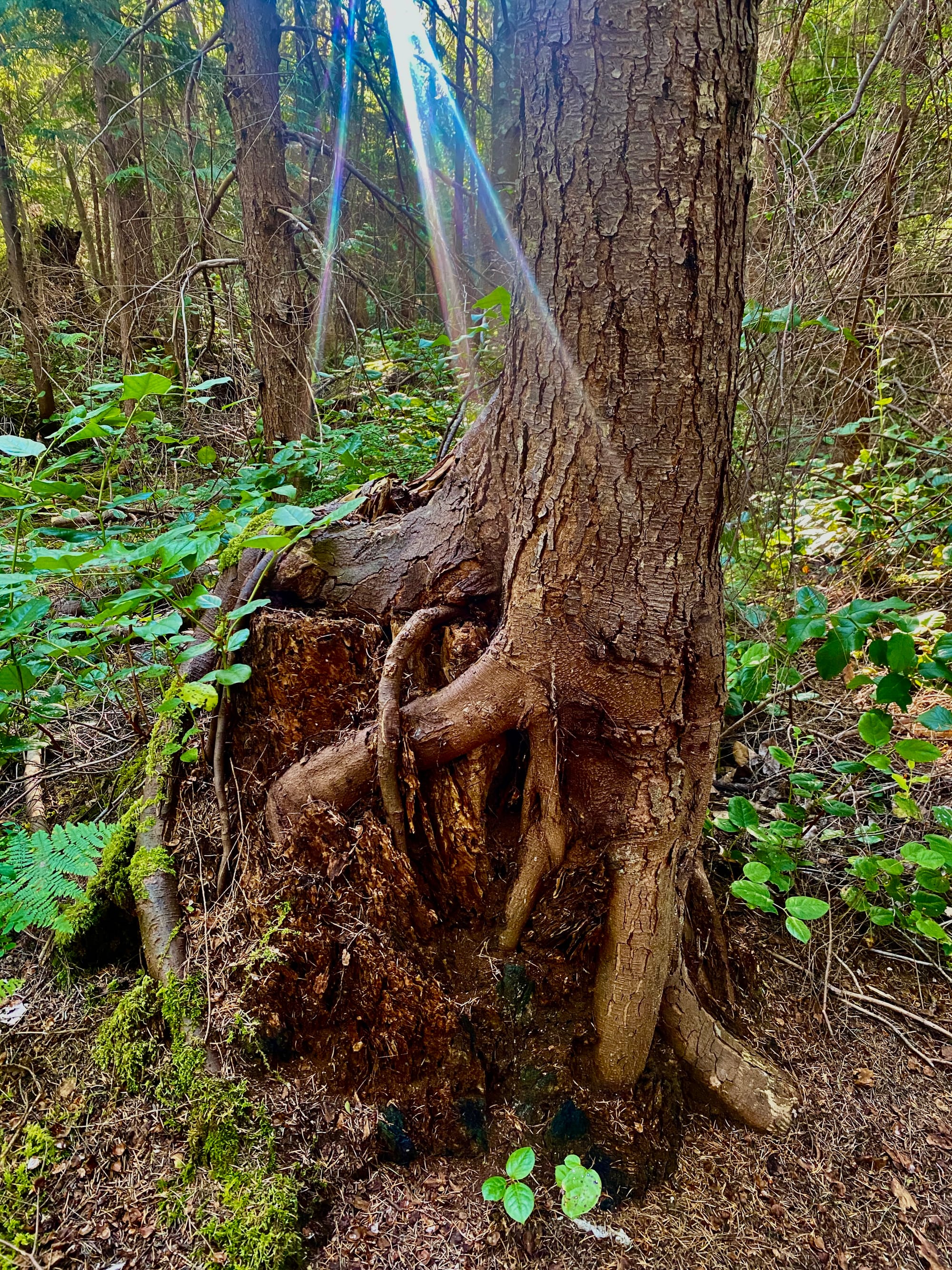
In 2010, in an interview with Krista Tippet, Macy described being a young woman in Germany in the 1950s, a young woman who had become fluent in the language and was becoming a translator: "And one day, I walked into a bookstore on Adalbertstrasse near the university, and there on a table was this little cloth-bound book in rag paper. It was exquisite. It was Das Stunden-Buch, The Book of Hours. I picked it up, and the poem that it opened to was the second poem of the first part, “Ich lebe mein Leben in wachsenden Ringen,” “I live my life in widening circles” — and that something immediately rearranged in the furniture of my mind.
Here it is in a translation I believe she made with Anita Barrows: :
I live my life in widening circles
that reach out across the world.
I may not complete this last one
but I give myself to it.
I have been circling around God, that primordial tower.
I’ve been circling for thousands of years
and I still don’t know: Am I a falcon,
a storm, or a great song?
She told Tippet of the encounter with the poem: "I identified completely with it, and I saw — it was just eight lines in that poem — that it could redefine that I was on a spiritual path, that because I wasn’t on the linear road, up the ladder, up Jacob’s ladder to get closer to God, that God had been there all the time, and I was orbiting around him, and that it had been happening, actually, for thousands of years."
The woman that was Joanna Macy is gone. And still here as books, teachings, in students, friends, and through broad influence even beyond those who know her and her work. She's a tree that's fallen; she's a tree that trees have grown out of; she's now part of the past, but also she fed and nourished and loved and guided a possible future, a hopeful and demanding future, demanding in that we would have to change ourselves and our society to make it.
It's almost strange to think about her integrity, her compassion, her generosity at a time when the news is full of stories about cruel and corrupt men and the wreckage they've strewn all around them, but she's a reminder that their opposite is also present in the world and even in the nation; the same society produced them both. Joanna Macy is gone. Joanna Macy is with us in a thousand ways and even if she fades from the conversation about who we are and what we can do about our relationship with the planet, she will be underneath the effort of countless others, feeding and anchoring their work.
There's a Jewish response when hearing of a death: "May their memory be a blessing." With Macy there is no need to wish it be so; we know her life was a long blessing as out of love for the earth and tenderness toward what impairs our care for it, she toiled, studied, created, translated from other languages into English but also translated from inchoate emotions like fear and grief to clarity and action, translated the riches of Tibetan Buddhism into what she believed might be useful to us in the Western world, and what might make us useful to the survival of the natural world.
Berries of many kinds are ripening in this forest on the shores of an inland sea; I eat blackberries, both Himalayan and native, red huckleberries of a kind new to me, a couple of salmonberries whose drupelets look like golden-red fish eggs, see again and again the trunks of cedars curving before rising, like the prow of ships sailing through the deep time of these forests, see the roots that reach for darkness, the trunks and branches that reach for light, see this place in the gentle weather of summer, see the great trunks of trees that washed ashore in the storms of winter, see ravens, an owl, robins, eagles, buzzards, seagulls. I see love in the signs of how people have cared for and protected and walked these woods. I see deep time in the old trees and the cycle of life.
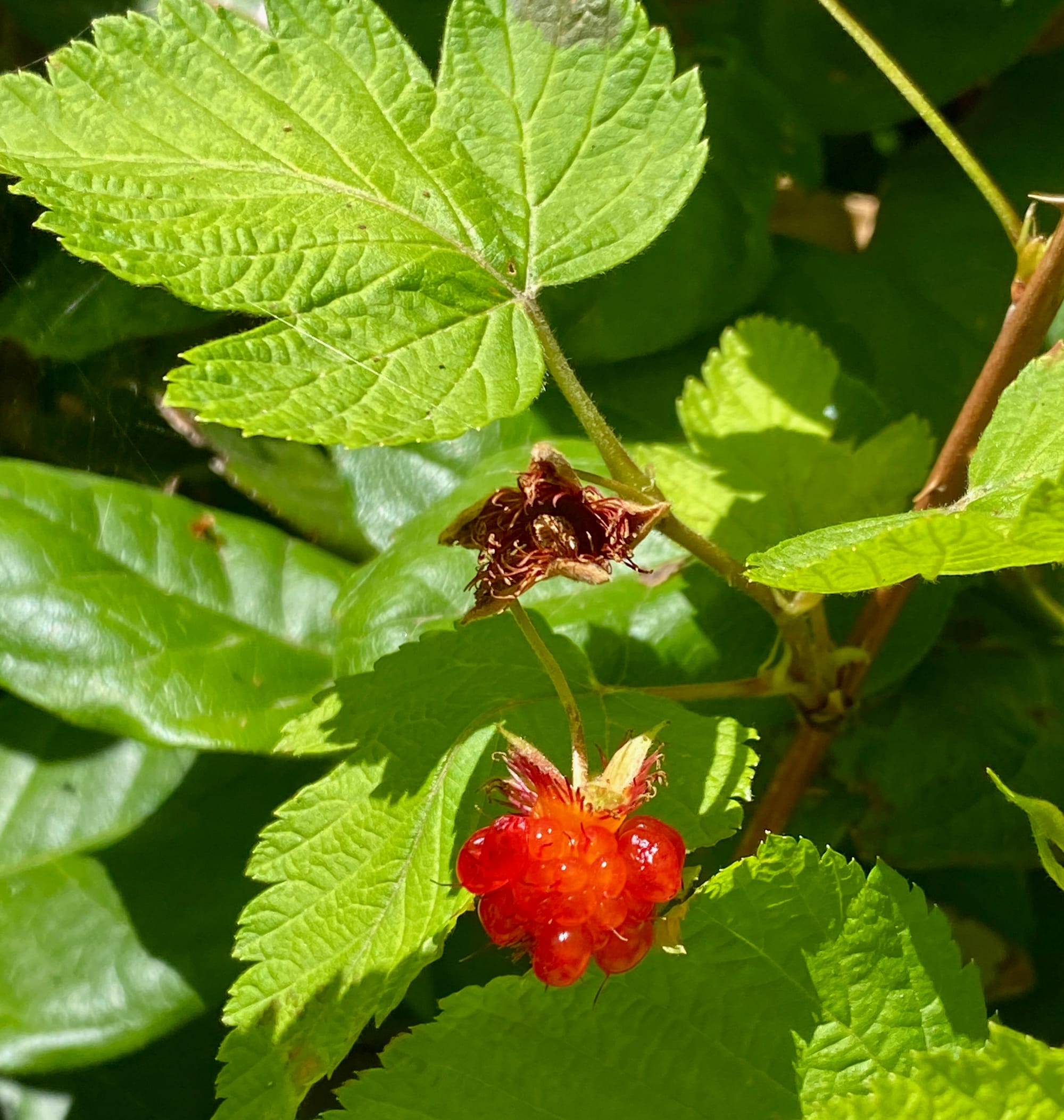
Macy said to Tippet in that 2010 interview, "But actually, we’re made for that. There’s a song that wants to sing itself through us, and we’ve just got to be available. Maybe the song that is to be sung through us is the most beautiful requiem for an irreplaceable planet or maybe it’s a song of joyous rebirth as we create a new culture that doesn’t destroy its world." She invited us to sing both songs or maybe to know they're the same song, to sing the requiem for a dying world that could welcome what remains possible.
She is present, she is gone beyond, she has become a falcon, a storm, a great song.
p.s. Joanna recently recorded a series of conversations with her young friend Jessica Serrante, which you can listen to here: https://podcasts.apple.com/us/podcast/we-are-the-great-turning/id1740825892
Her conversation with Krista Tippett in 2010 is here (and can also be found there as a transcript): https://podcasts.apple.com/us/podcast/on-being-with-krista-tippett/id150892556?i=1000436480200

